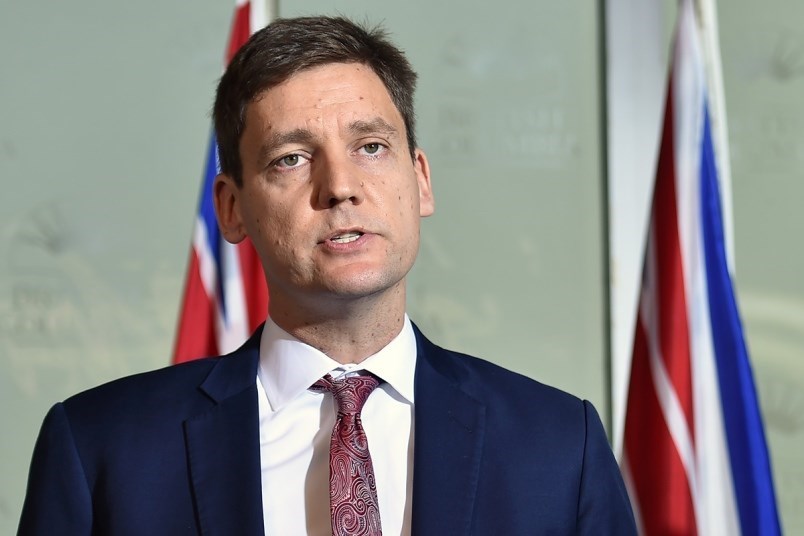Premier David Eby is readying for his first overseas trade mission this weekend, where he’ll assume the role of the province’s chief salesman as he touts B.C.’s commodities and talent to Indo-Pacific leaders.
Eby leaves Saturday for an 11-day trip to Japan, South Korea and Singapore. He’ll be accompanied by Energy Minister Josie Osborne, Economic Development Minister Brenda Bailey and Minister of State for Trade Jagrup Brar.
“I’ll be the first premier visiting the Indo-Pacific region post-COVID,” Eby said in an interview with Glacier Media.
“A lot has shifted in the global economy since pre-COVID and one of the key goals of this trip is to recognize that British Columbia’s ability to diversify our trade patterns and strengthen our relationships with countries in our Indo-Pacific region will mean that our economy is better equipped to handle the kind of shocks we see through things like war, pandemics and international fights between big players like the United States and China.
“I’m really hopeful in building the kind of personal relationships that will help British Columbia capitalize on that.”
First stop, Japan, which is B.C.’s third-largest trading partner after the United States and China. B.C. does more business with Japan than any other province in Canada.
B.C. was just there in 2020 on a trade mission to sell engineered mass-timber products, to try to bolster the flagging provincial forest sector. B.C. exports almost $6 billion worth of goods to Japan annually — mainly coal, copper and wood.
Eby, though, is expected to zero in on Japan’s energy market during meetings with the Governor of Tokyo and manufacturing giant Mitsubishi.
“They are playing an increasingly important global role around relationships between big economies, in particular their needs line up very nicely with the resources that British Columbia has,” he said.
“For example, Japan has very significant energy needs, and through Mitsubishi they are participating in LNG Canada, which is a significant project here in British Columbia. A lot of that LNG will be going to Japan.
“But they are already moving to hydrogen as the solution to their long-term energy needs in a more sustainable and climate responsible way and that’s also where we’re going in British Columbia.”
B.C.-based Ballard Power’s work on hydrogen fuel cells will be of particular value to Japan, as well as subsidiaries of BC Hydro working to produce greener hydrogen and ship it directly to Japan, said Eby.
“I think there’s huge potential opportunity there,” he said.
Eby then visits South Korea, where B.C. exports almost $4 billion annually, most of which is coal but also copper, natural gas, wood pulp and zinc. South Korea and B.C. have an economic relationship that dwarfs all the other provinces in Canada combined.
Here too, though, Eby is taking a more unorthodox approach, emphasizing cultural ties and animation studios in B.C. owned by Korean companies, like Tree Top Party.
He’s also set to visit SK Ecoplant Co., a Korean-based battery manufacturer making inroads into the United States, with the hopes of boosting critical mineral sales from B.C. mines.
In Singapore, Eby said he plans to meet with the country’s public housing authority and housing development boards, because he’s interested in the country’s progress in building a wide breadth of public housing in high-density areas.
“There are some really impressive things they’ve done around housing that I’m excited about seeing in person and hearing about their experience,” he said.
Singapore is a much smaller trading partner with B.C., at only $166 million in exports in 2022, but it is also a rapidly-growing economy as a major port city.
“They have a number of companies interested in critical minerals, energy and resource-related products from British Columbia,” said Eby.
B.C. is enjoying prominence for its critical mineral sector, as both the largest supplier of copper in Canada, but also a source of silver, zinc, lead and other critical minerals needed for things like batteries, electric vehicles, solar panels, wind turbines and other clean energy products.
B.C.’s mining industry is so important, it was recently cited by Prime Minister Justin Trudeau and U.S. President Joe Biden as crucial to meeting North America’s transition to clean technology, in the face of hostility from Russia and China.
That kind of economic backdrop could make Eby’s mission less vulnerable to the typical criticism that trade missions by premiers are usually useless travel junkets. Eby said B.C.’s business community does not feel that way, and that it has encouraged him to take advantage of the Indo-Pacific relationships already forged by the federal government.
B.C. is not taking a private business contingent, as Eby said this trip is mostly about initial meetings at a political level.
“It’s really an introduction and first hand-shake set of meetings,” he said. “The goal is follow-up meetings with businesses and key sectors of interest.”
The trip will also dovetail with the province’s new trade strategy to increase exports in new targeted markets like Mexico, Vietnam and Taiwan. Brar departed early and is currently spending several days in Vietnam on a solo trade mission.
One destination not on B.C.’s agenda: China. Neither the Canadian government, nor other provinces, are currently conducting trade missions to China, given the fallout of the detention of Canadians Michael Spavor and Michael Kovrig, and the ongoing allegations of Chinese interference in Canadian elections. Eby said it will be more valuable to spend time in other countries anyway.
“The B.C. economy does a lot of trade with China currently,” he said. “The aim with this set of visits and our recent trade diversification strategy is to diversify our trade partnerships and take advantage of shifts we’ve seen.”
Rob Shaw has spent more than 15 years covering B.C. politics, now reporting for CHEK News and writing for Glacier Media. He is the co-author of the national bestselling book A Matter of Confidence, host of the weekly podcast Political Capital, and a regular guest on CBC Radio. [email protected]




